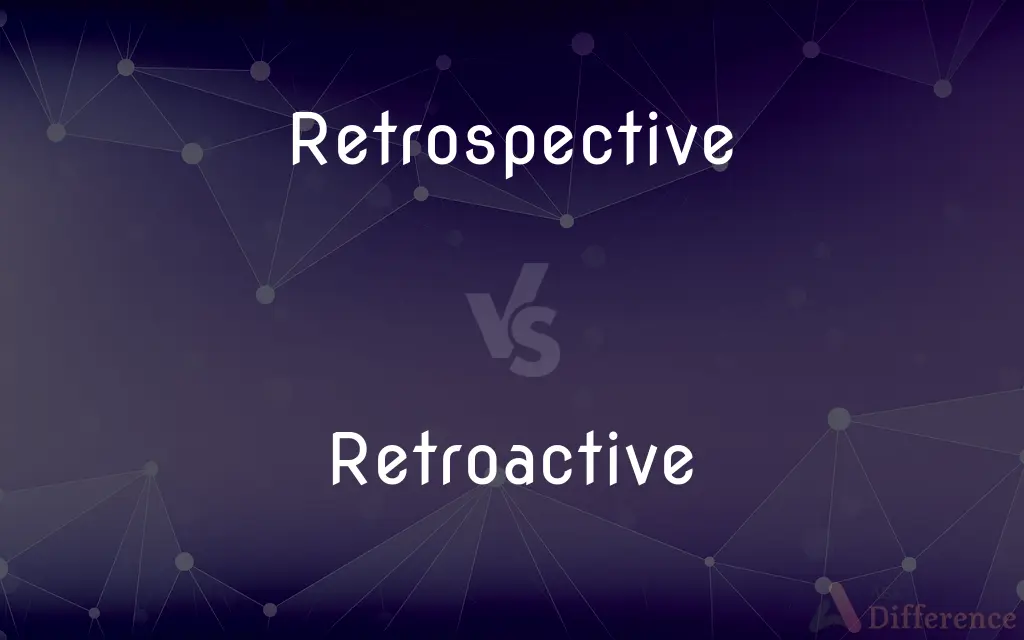Retrospective vs. Retroactive — What's the Difference?
By Tayyaba Rehman & Maham Liaqat — Updated on March 7, 2024
Retrospective refers to looking back at events or works from the past, often involving analysis or review. Retroactive applies to laws, rules, or decisions that take effect from a date in the past, altering the status of previous actions or conditions.

Difference Between Retrospective and Retroactive
Table of Contents
ADVERTISEMENT
Key Differences
Retrospective often relates to the act of reflecting on or dealing with past events, artworks, or periods, emphasizing a backward-looking perspective. This can involve analyzing historical data, revisiting previous artistic phases, or evaluating past actions with the benefit of current knowledge. For example, a retrospective art exhibition showcases works from various phases of an artist's career, providing insights into their development and themes over time.
Retroactive, on the other hand, is a term primarily used in legal and policy contexts to describe actions or measures that are applied to a time before their actual implementation. This means that a new rule or law affects actions, agreements, or conditions that occurred before the rule or law was put in place. For instance, a retroactive tax law might change the tax liabilities for individuals or businesses for a previous fiscal year, impacting financial decisions made without knowledge of the upcoming change.
In a retrospective analysis or study, the focus is on collecting and examining data from past events to draw conclusions, identify trends, or learn lessons that can inform future decisions or understandings. Such analyses are common in fields like history, medicine, and social sciences, where understanding the progression and outcomes of past events is crucial for building knowledge.
Retroactive adjustments or changes can be controversial, especially when they significantly alter the expected outcomes or obligations of parties involved based on past actions. For example, retroactive laws might be perceived as unfair or disruptive, as they can change the legal consequences of actions taken when different rules were in effect.
While retrospective approaches often have a nostalgic or analytical aspect, aiming to celebrate, understand, or critique past works or events, retroactive measures are typically pragmatic, intended to address or correct issues, enforce new standards, or realign with current needs or values, even if it means altering the implications of past actions.
ADVERTISEMENT
Comparison Chart
Definition
Looking back at or dealing with past events or works.
Applying a new rule or change to past actions or events.
Context
Art, history, analysis, and review.
Legal, policy, and administrative decisions.
Purpose
To understand, learn from, or celebrate the past.
To correct, adjust, or enforce standards retroactively.
Focus
Reflective and often analytical or nostalgic.
Pragmatic, aimed at addressing past issues or aligning with current values.
Examples
Retrospective art exhibitions, historical analyses.
Retroactive laws, policy changes, contractual adjustments.
Compare with Definitions
Retrospective
Involving a review of past works.
The retrospective book captured the evolution of 20th-century design.
Retroactive
Changing the legal status of past actions.
The amendment to the law had retroactive effects on previous cases.
Retrospective
Reflecting on or dealing with past events.
The museum's retrospective exhibition showcased the artist's career highlights.
Retroactive
Adjusting agreements or conditions from the past.
The contract changes were implemented retroactively, affecting past payments.
Retrospective
Analyzing historical data or trends.
The study conducted a retrospective analysis of patient outcomes over the last decade.
Retroactive
Applying new rules to past actions or events.
The new tax legislation was made retroactive to the beginning of the year.
Retrospective
Looking back at past periods or styles.
The documentary offered a retrospective look at the fashion trends of the 1960s.
Retroactive
Enforcing standards or corrections backward in time.
The policy revision was retroactively applied to all existing members.
Retrospective
Celebrating or critiquing past achievements.
The award ceremony included a retrospective segment honoring pioneers in the field.
Retroactive
Impacting past decisions with current changes.
The retroactive clause in the regulation affected decisions made years ago.
Retrospective
A retrospective (from Latin retrospectare, "look back"), generally, is a look back at events that took place, or works that were produced, in the past. As a noun, retrospective has specific meanings in medicine, software development, popular culture and the arts.
Retroactive
Influencing or applying to a period prior to enactment
A retroactive pay increase.
Retrospective
Looking back on, contemplating, or directed to the past.
Retroactive
Extending in scope, effect, application or influence to a prior time or to prior conditions
Retrospective
Looking or directed backward.
Retroactive
Fitted or designed to retroact; operating by returned action; affecting what is past; retrospective.
Retrospective
Applying to or influencing the past; retroactive.
Retroactive
Descriptive of any event or stimulus or process that has an effect on the effects of events or stimuli or process that occurred previously
Retrospective
Of, relating to, or being a retrospective
A retrospective art exhibition.
Retroactive
Affecting things past;
Retroactive tax increase
An ex-post-facto law
Retro pay
Retrospective
An exhibition or performance of works produced by an artist over a considerable period.
Retrospective
Of, relating to, or contemplating the past.
Retrospective
Looking backwards.
Retrospective
Affecting or influencing past things; retroactive.
Retrospective
An exhibition of works from an extended period of an artist's activity.
Retrospective
Looking backward; contemplating things past; - opposed to prospective; as, a retrospective view.
The sage, with retrospective eye.
Retrospective
Having reference to what is past; affecting things past; retroactive; as, a retrospective law.
Inflicting death by a retrospective enactment.
Retrospective
An exhibition of a representative selection of an artist's life work
Retrospective
Concerned with or related to the past;
Retrospective self-justification
Common Curiosities
Can a retrospective be applied to personal experiences?
Absolutely, individuals often engage in retrospective reflection on personal experiences to gain insights, understand changes, or assess personal growth over time.
Are retroactive laws common?
While not the norm due to concerns about fairness and predictability, retroactive laws are used in certain contexts to address past oversights, align with current standards, or correct legislative errors.
Is retroactivity always legal?
The legality of retroactivity depends on the jurisdiction and specific legal principles involved; some legal systems limit or prohibit retroactive laws, especially in criminal law.
Can retroactive measures be applied to international agreements?
Retroactive measures can be complex in international agreements and typically require careful negotiation and consensus, as they can affect trust and reliability between parties.
What are the challenges of implementing retroactive policies?
Challenges include legal constraints, ethical considerations, and the potential for negative impacts on individuals or organizations who relied on previous rules or conditions.
How do artists benefit from retrospective exhibitions?
Artists benefit from retrospective exhibitions by gaining recognition for their body of work, connecting past and present works, and providing audiences with deeper insights into their artistic journey.
Can a retrospective approach be used in decision-making?
Yes, a retrospective approach can inform decision-making by analyzing past outcomes and experiences to guide future choices and strategies.
How do retrospectives contribute to cultural understanding?
Retrospectives help in cultural understanding by offering insights into historical contexts, artistic evolutions, and societal changes, enriching our appreciation and knowledge of past eras.
How do historians use retrospective analyses?
Historians use retrospective analyses to examine events, trends, and figures from the past, contributing to a deeper understanding of historical contexts and their impact on the present.
What are the ethical considerations of retroactive changes?
Ethical considerations include the principles of fairness, justice, and predictability, ensuring that retroactive changes do not unduly penalize individuals or entities for past actions taken in good faith.
Share Your Discovery

Previous Comparison
Fur vs. Leather
Next Comparison
Timber vs. PlywoodAuthor Spotlight
Written by
Tayyaba RehmanTayyaba Rehman is a distinguished writer, currently serving as a primary contributor to askdifference.com. As a researcher in semantics and etymology, Tayyaba's passion for the complexity of languages and their distinctions has found a perfect home on the platform. Tayyaba delves into the intricacies of language, distinguishing between commonly confused words and phrases, thereby providing clarity for readers worldwide.
Co-written by
Maham Liaqat















































